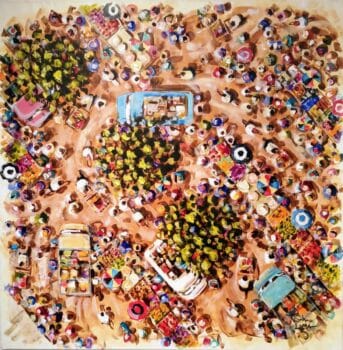Dear friends,
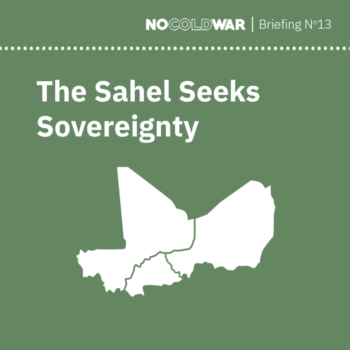 Greetings from the desk of Tricontinental: Institute for Social Research.
Greetings from the desk of Tricontinental: Institute for Social Research.
On 2 October 1958, Guinea declared its independence from France. Guinea’s President Ahmed Sékou Touré clashed against France’s President Charles De Gaulle, who tried to strong arm Touré into abandoning the project for independence. Touré said of De Gaulle’s threats, ‘Guinea prefers poverty in freedom to riches in slavery’. In 1960, the French government launched a covert operation called Operation Persil to undermine Guinea and overthrow Touré. The operation was named after a laundry detergent, used to wash away dirt. This provides a clear window into the French attitude toward Touré’s government. France’s weapons shipment to opposition groups in Guinea was interdicted in Senegal, whose President Mamadou Dia complained to the French government. France would not tolerate African independence, but the people of Africa would not tolerate French dominion.
That fervour for African sovereignty remains intact. ‘France, get out’ was the slogan then and remains the slogan now, from Senegal to Niger. To better understand recent developments in this struggle, the rest of this newsletter features a briefing from No Cold War and the West Africa Peoples’ Organisation on the manifestation of that sentiment in the Sahel.
Briefing 13: The Sahel Seeks Sovereignty
The call ‘La France degage!’ (‘France, get out!’), against the ongoing legacy of French colonialism in the region, has long echoed across West Africa. In recent years, this call has reached a new pitch of intensity, from the 2018 grassroots movements in Senegal and newly elected President Bassirou Diomaye Faye’s campaign promise to unshackle his country from the neocolonial monetary system of the CFA franc to the popularly supported military coups in Mali, Burkina Faso, and Niger and the ejection of French military forces from these countries between 2021 and 2023.
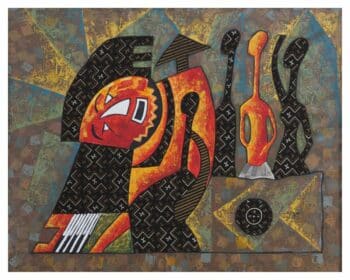
Suncréa (Mali), Racines (‘Roots’), 2016.
The military-led governments of the central Sahelian states (Mali, Burkina Faso, and Niger) have taken steps to wrestle their sovereignty from Western monopolies—such as reviewing mining codes and contracts and expelling foreign militaries—and to establish new regional cooperation platforms. On 16 September 2023, the governments of Burkina Faso, Mali, and Niger signed the Liptako-Gourma Charter, a mutual defence pact that established the Alliance of Sahel States. This trilateral partnership is a response to the threats of military intervention and economic sanctions that have been levied against Niger by the Economic Community of West African States (ECOWAS) following the July 2023 popular coup that took place in the country.
A few months after reaching this defence cooperation agreement, the three countries withdrew from the ECOWAS regional bloc. Some political commentators have claimed that these events—combined with the ejection of French military forces from the region—‘spell trouble’ for regional social security, economic development, political stability, and regional integration. What is behind the tidal wave sweeping through the Sahel, and what does it mean for the region?
The Legacy of French Colonialism
Anti-imperialist sentiment has been brewing in the Sahel for years. To look at the case of Niger, which is emblematic of the wave of resistance in the region, during the July 2023 coup, the people took to the streets against the French colonial hangover that has facilitated rampant, structural corruption and disenfranchised large sectors of the population.
Much of this corruption has taken place in Niger’s mining sector, which represents one of the world’s largest high-grade uranium deposits. For instance, in 2014, prior to the coup, then Nigerien President Mahamadou Issoufou lowered taxes on mining activities that directly benefited French monopolies, receiving indirect pay outs in return. Meanwhile, the French military in Niger operated as the gendarme for mining companies and against those seeking to migrate to Europe.
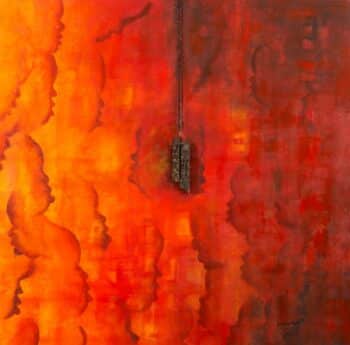
Amy Sow (Mauritania), Énergie durable (‘Sustainable Energy’), 2015.
Société des Mines de l’Aïr (Somaïr), a purported ‘joint venture’ between Niger and France in the uranium industry, is yet another example of the continued French influence in the region and on the continent. While France’s Atomic Energy Commission and two French companies own 85% of the company, Niger’s government owns a mere 15%. While close to half of Niger’s population lives below the poverty line and 90% lives without electricity, as of 2013 uranium from Niger powers one in three lightbulbs in France. It should come as no surprise that, shortly after the 2023 coup, Nigerien citizens seized the French embassy and military base in the capital of Niamey. France withdrew its troops soon after.
Sovereignty, Security, and Terrorism
On 16 March 2024, the Nigerien government revoked a decade-old military agreement with the United States, just two days after a U.S. delegation met with local authorities to raise concerns over the nation’s partnerships with Russia and Iran. In a public statement, the government of Niger ‘forcefully condemne[d] the condescending attitude, accompanied by the threat of retaliation, from the head of the U.S. delegation towards the government and people of Niger’. The statement added that ‘Niger regrets the intention of the U.S. delegation to deny the sovereign Nigerien people the right to choose their partners and the types of partnerships that are capable of truly helping them fight terrorism at a time when the United States of America has unilaterally decided to suspend all cooperation’. The government also cited the following as reasons for revoking the agreement with the US: the cost it has inflicted upon Nigerien taxpayers, the lack of communication around domestic operations and U.S. military base activities, unauthorised aircraft movements, and the ineffectiveness of its so-called counter-terrorism work.
The U.S. has established the single largest foreign military presence on the African continent, beginning with the 2002 Pan-Sahel Initiative and followed by the creation of the U.S. Africa Command (AFRICOM) in 2007, which set up a significant network of U.S. military bases across the Sahel (of which there are nine in Niger alone as well as two in Mali and one in Burkina Faso). In 2007, U.S. State Department adviser J. Peter Pham defined AFRICOM’s strategic objective to U.S. House of Representatives Committee on Foreign Affairs as follows:
Niankoye Lama (Guinea), Marché de Zali (‘Zali Market’), 2022.
It is unlikely that any amount of public relations work will fully quench anti-imperialist concerns that AFRICOM is fundamentally an attempt to erect a bulwark in Africa against trans-national terrorism and China’s appetite for Africa’s oil, minerals, and timber… The proposed structure of AFRICOM, consisting of four or five relatively small bases with no force deployments, means that these will be largely invisible even in their host countries and societies.
In the aftermath of the North Atlantic Treaty Organisation’s (NATO) war on Libya led by France and the U.S., the Sahel region has been embroiled in conflicts, many of them driven by emerging forms of jihadist armed activities, piracy, and smuggling. France and the U.S. have used these conflicts as a pretext to increase their military interventions across the region. In 2014, France set up the G5 Sahel (a military arrangement that included Burkina Faso, Chad, Mali, Mauritania, and Niger) and expanded or opened new military bases in Gao, (Mali), N’Djamena (Chad), Niamey (Niger), and Ouagadougou (Burkina Faso). In 2019, the U.S. began conducting drone strikes and aerial surveillance across the Sahel and the Sahara Desert from its Air Base 201 outside Agadez (Niger)—the largest construction effort in U.S. Air Force history.
The Global Terrorism Index found that the Sahel region was the most impacted by terrorism in 2023, accounting for nearly half of all terrorism-related deaths and 26% of terrorist incidents worldwide. Burkina Faso, Mali, and Niger each ranked among the top ten countries most impacted by terrorism, a fact often held up to allege the failure of the new military-led governments. However, this reality predates the coups of 2021—2023 and instead speaks to the impact of U.S. and French military intervention. Between 2011 (the year of NATO’s war on Libya) and 2021 (the year of the first of the recent wave of Sahelian coups, in Mali), Burkina Faso, Mali, and Niger soared from positions 114, 40, and 50, respectively, on the index of countries most impacted by terrorism to 4, 7, and 8. It is clear that the U.S. and French ‘war on terrorism’ has done little to improve security in the region and has in fact had the opposite effect.
Seeking New Partners and Paths
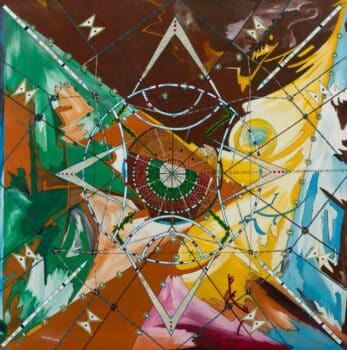
Ibrahim Chahamata (Niger), Emity Na-Zahir (‘Climate Change’), 2015.
The people of the Sahel have grown disillusioned not only with the West’s military strategies, as seen by the increasing security cooperation agreements with other countries, but also with Western economic policies that have yielded little social development. Despite the region’s abundant energy resources (including Niger’s aforementioned uranium reserves), the Sahel has some of the world’s lowest levels of energy generation and access, with at least 51% of the population unable to access electricity.
Though the Alliance of Sahel States began as a defence pact, political autonomy and economic development are a core focus. This includes, for instance, pursuing joint energy projects and exploring the possibility of establishing regional civil nuclear power initiatives. Burkina Faso has already signed agreements with Rosatom, a state-owned Russian company, to build new power plants while Mali is advancing its application of atomic energy through the National Nuclear Programme, overseen by the Malian Radiation Protection Agency.
Ultimately, the Alliance of Sahel States represents an attempt to uphold the demands of sovereignty and the right to self-determination—an agenda that the people of Niger, Burkina Faso, and Mali have poured into the streets to support.
Events in the Sahel are unfolding at a rapid pace, but as the Malian novelist Aïcha Fofana wrote in La fourmilière (‘The Anthill’) in 2006, modernisation is tempered by the rigidities and wisdom of the old ways. ‘We have always been generous’, the griot in La fourmilière says to a young man who has many ideas about transforming society. Patience is necessary. Change is coming. But it is coming at its own pace.
Warmly,
Vijay


